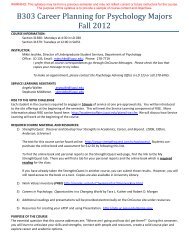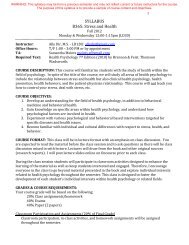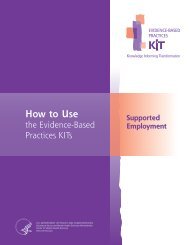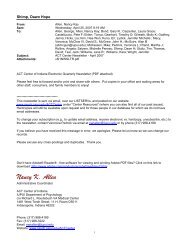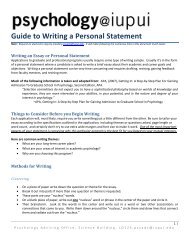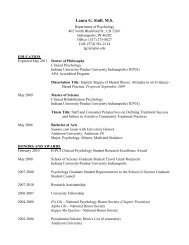Supported Employment: Training Frontline Staff - SAMHSA Store ...
Supported Employment: Training Frontline Staff - SAMHSA Store ...
Supported Employment: Training Frontline Staff - SAMHSA Store ...
You also want an ePaper? Increase the reach of your titles
YUMPU automatically turns print PDFs into web optimized ePapers that Google loves.
that do not provide clinical services may collaborate<br />
with external clinics to provide integrated care to<br />
consumers receiving SE services.<br />
To do so, invite practitioners from other agencies<br />
to be part of the treatment team and to attend<br />
team meetings. While schedules may not permit<br />
these practitioners to attend all meetings, frequent<br />
communication through telephone calls, voicemail<br />
messages, and e-mail are helpful.<br />
Many agencies also collaborate with the<br />
Rehabilitation Services Administration (also known<br />
in some states as the Office of Rehabilitation<br />
Services or Vocational Rehabilitation) to provide<br />
SE services. Vocational rehabilitation and mental<br />
health agencies share the goal of helping people<br />
with disabilities return to work and increase their<br />
independence.<br />
Historically, the two state systems have not always<br />
collaborated in a way that provides seamless and<br />
coordinated services for consumers. If your agency<br />
is in the process of building a more collaborative<br />
relationship with your local vocational rehabilitation<br />
office, communication and commitment are two<br />
essential ingredients that promote an effective<br />
working relationship.<br />
Mental health agencies must educate their<br />
vocational rehabilitation partners about mental<br />
health services and vocational rehabilitation<br />
counselors must educate their mental health<br />
partners about their services. Understanding the<br />
guidelines and practices of each other’s system will<br />
close the gaps that have formed barriers and create<br />
new ways of working together to provide more<br />
effective services for consumers.<br />
Collaborations with your local Vocational<br />
Rehabilitation Office may bring added resources<br />
and services. For example, vocational rehabilitation<br />
counselors may provide the following:<br />
• <strong>Training</strong>;<br />
• Additional job shadowing;<br />
• Job-related equipment and supplies;<br />
• School tuition;<br />
• Planning assistance; and<br />
• Assistance with placement and support.<br />
Agencies with effective relationships with their<br />
local Vocational Rehabilitation Office communicate<br />
regularly with vocational rehabilitation counselors.<br />
Often a counselor may be included on the<br />
consumer’s treatment team. The counselor can<br />
purchase services, identify external resources,<br />
arrange services from other agencies, and provide<br />
guidance.<br />
Remember that different agencies have different<br />
policies and procedures for service delivery. The<br />
goal is to work out the barriers as much as possible<br />
so that consumers receive seamless services and are<br />
not caught between agencies and systems.<br />
In summary, establishing and maintaining allies<br />
among stakeholders is extremely important in<br />
supporting the work lives of consumers. The skills<br />
reviewed above will help you work effectively with<br />
consumers, families, employers, team members,<br />
and practitioners from other agencies. It is<br />
important to seek their perspectives early and often<br />
in the process and communicate regularly.<br />
<strong>Training</strong> Job Supports <strong>Frontline</strong> and Collaborations <strong>Staff</strong> 17 Module 4



